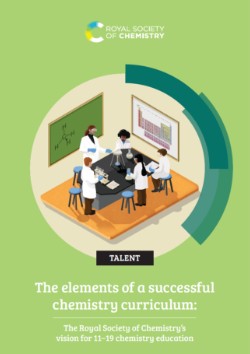The ����ӰԺ believes everyone is entitled to an excellent chemistry education that is engaging, inspiring and relevant. It should equip learners with the skills and understanding they need to be scientifically literate citizens and to pursue the study of chemical sciences at higher levels should they so wish. The chemistry curriculum that school-age learners experience is fundamental to achieving this.
This report presents an overview of the ����ӰԺ’s curriculum framework at ages 11-19; what is presented here represents what we see as the core of an ideal chemistry curriculum, but by no means its totality. The framework is designed to allow learners to encounter a wide range of modern chemistry, to demonstrate both its impact on everyday life and its potential to address some of the major problems facing society in the 21st century.
Building on evidence and expertise
This is a community and evidence-informed framework, developed by a succession of curriculum and assessment working groups composed of chemistry teachers, curriculum designers, assessment specialists, and representatives from Higher Education and industry. The working groups drew on evidence about good curriculum design generally, on effective learning in chemistry, and looked at current practice. They thought about the most important knowledge and skills to teach to learners aged 11-19, as well as the guiding principles that should underpin good curriculum design. Our curriculum framework emerged from these discussions.
We aim to influence the development of chemistry curricula and qualifications by governments and other authorities throughout the UK and Ireland. While this framework is intended to be a valuable resource to policymakers and curriculum designers, we hope it will also be of interest and use to teachers.
This is the beginning of a longer conversation; future publications will expand on the ideas in this report. Whilst work will continue to refine and develop the 11-19 framework, we are also developing our thoughts around primary, technical and undergraduate curricula.
Related pages
- Science teaching survey results 2022
- New insights into the school science technician workforce
- Teacher training during the pandemic and the long-term impact on practical work in schools
- Higher technical education - research provides new insight into the needs of learners, providers and employers
- Listen to our award winning podcasts covering many aspects of sustainability
- See all our chemistry education policy
- See our inclusion and diversity policy
- See all our policies, reports, evidence and campaigns
Education Policy
- Tel:
- +44 (0)20 7440 3353
- Email:
- Send us an email


